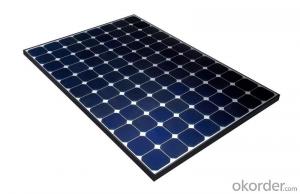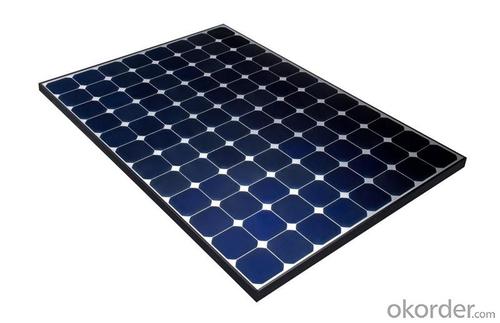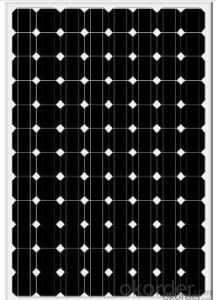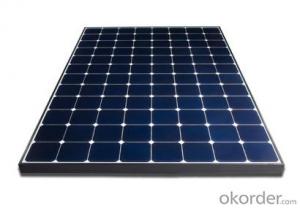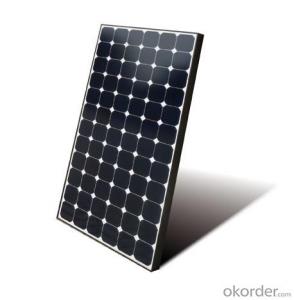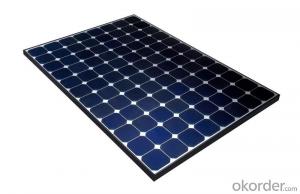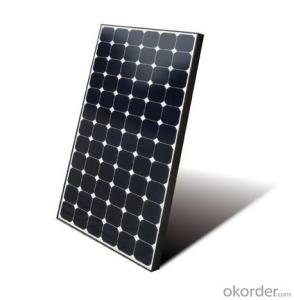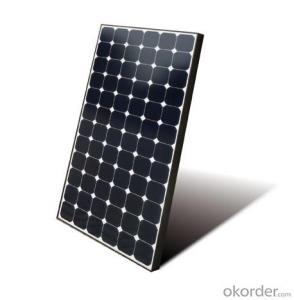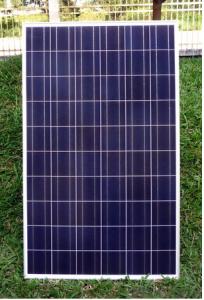Solara Solar Panels - CNBM Poly 185W Solar Panel with TUV UL CE Certificate for Residential
- Loading Port:
- Shanghai
- Payment Terms:
- TT OR LC
- Min Order Qty:
- 500 watt
- Supply Capability:
- 1000 watt/month
OKorder Service Pledge
OKorder Financial Service
You Might Also Like
Specification
CNBM Poly 185W Solar Panel with TUV UL CE Certificate For Residential
Introduction
Electrical connections are made in series to achieve a desired output voltage and/or in parallel to provide a desired current capability. The conducting wires that take the current off the modules may contain silver, copper or other non-magnetic conductive [transition metals]. The cells must be connected electrically to one another and to the rest of the system. Externally, popular terrestrial usage photovoltaic modules use MC3 (older) or MC4 connectors to facilitate easy weatherproof connections to the rest of the system.
Each module is rated by its DC output power under standard test conditions, and typically ranges from 100 to 365 watts. The efficiency of a module determines the area of a module given the same rated output – an 8% efficient 230 watt module will have twice the area of a 16% efficient 230 watt module. There are a few solar panels available that are exceeding 19% efficiency. A single solar module can produce only a limited amount of power; most installations contain multiple modules. A photovoltaic system typically includes a panel or an array of solar modules, a solar inverter, and sometimes a battery and/or solar tracker and interconnection wiring.
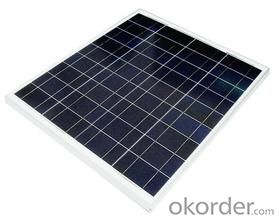
Suggested application
Home lighting business lighting,
Garden lighting, pavement lighting
Farmer household lighting
Decorative water pump
Traffic signal lighting
Industry area
Business area
Solar Power Plant
Product feature
Modules are made of Monocrystalline or Polycrystalline Silicon cell.
Materials and color of the solar panel frame: Clear anodized aluminum alloy type 6063T5 Universal frame; Silver-white color;
The output connection gathers the coupling: Selects conforms to the IEC-612615; 2005, class II, IEC61730 international standard; Airtight waterproofing binding clamp;
Module seal structure: The surface is thick, the high diaphanous rate armored glass with solar cell board special-purpose 3.2mm becomes after the high temperature lamination craft. The back selects has waterproof and anti- aged performance fine TPT materials. The entire block battery board has, the waterproofing, the anti- aging airtight and so on the fine performance;
Power tolerance: +/-3%
Packaging
International standard cartons (according to the requirements of customers)
- Q: A solar panel facing the sun at noon in mid-summer receives more intensity of the light than when it is at horizontal. However, it can receives more total solar energy when it is at horizontal than when it is tilted during a long summer day. Regradless if it is shaded by building or trees. why is that so?
- That okorder /... it shows a graph and explains it better.
- Q: Can solar panels be installed on a golf course or clubhouse?
- Yes, solar panels can be installed on a golf course or clubhouse. The large open spaces found in these areas provide ideal conditions for solar panel installation, allowing for maximum exposure to sunlight and efficient energy generation. Additionally, integrating solar panels into golf courses and clubhouses can help reduce energy costs, lower carbon footprint, and promote sustainable practices in the sport and leisure industry.
- Q: Please tell me what they are made of and how the materials help the solar cell produce electricity. Im doing a science projects so i need help on knowing all this info. Its a debate, so i need correct information please.I will please need more information about the bad things about solar energy and solar panels. Please say what solar panels do to create pollution or do anything that is not friendly to the environment. If you want just give me a website. Thank you
- image voltaic cells paintings for the period of the photoelectric effect. Incoming photons knock out electrons of the textile, which being a semiconductor helps a small ability distinction. close to to the sunlight, each and everything could be very severe (like a Van Halen gig), radiation, energetic ions, magnetic fields, the works. of direction, NASA project planners could take all those issues into consideration. i ask your self what textile maintains to be stable at 5800? ok (or perhaps it fairly is not needed), and captures all photons of all energies, to be one hundred% powerful. The link provided by making use of Snow Blossom is extremely thrilling. I do in simple terms no longer look waiting to study the secondary link Thermophotovoltaics. Edit: image voltaic Flares may well be a difficulty. they're by making use of and great unpredictable, upward push for hundreds of miles, achieving hundreds of thousands of Kelvin.
- Q: Can solar panels be installed on refugee camps?
- Yes, solar panels can be installed on refugee camps. In fact, solar energy is often a viable and sustainable solution for providing electricity in these camps. Solar panels can be easily installed on rooftops or in open spaces, helping to meet the energy needs of refugees and improve their living conditions. Solar power can provide lighting, power for charging electronic devices, and even help run water pumps or refrigeration units. Its renewable nature and independence from the grid make it an ideal energy source for refugee camps, where access to reliable electricity is often limited.
- Q: Can solar panels be used in areas with frequent thunderstorms?
- Yes, solar panels can be used in areas with frequent thunderstorms. While thunderstorms may temporarily reduce the efficiency of solar panels due to cloud cover and reduced sunlight, they do not pose any significant risk to the panels themselves. Properly installed solar panels are designed to withstand various weather conditions, including thunderstorms. Additionally, the energy produced by solar panels during sunny periods can still offset the electricity consumed during stormy periods, making them a viable option for areas prone to thunderstorms.
- Q: Can solar panels be installed on a government building?
- Yes, solar panels can be installed on government buildings. Many government buildings have started adopting solar energy to reduce their reliance on traditional energy sources and to promote sustainability. The installation of solar panels on government buildings not only helps to decrease energy costs but also contributes to the overall effort of transitioning to cleaner and renewable energy sources.
- Q: I'm doing a project for school where I will buy a solar panel and utilize/improve the power output of the panel. I want the panel to have an improved amount of energy output compared to the original. My budget for the solar panel itself is ~$00. Anything else that will be needed is covered.Also, I will be comparing the power by lighting a light bulb and checking to see the output energy of the panel.Where or how should I approach this project?What are the parts of the solar panel that I will need to buy?What factors could I change/improve to improve the overall energy output?What are the things (other than the panel) that I will need to buy?How can I attach a light bulb to the solar panel?
- Solar okorder /
- Q: i am working on a project which requires small solar panels. i am looking for ones about 3X4. is there any way i could get these? and where?
- You could build them yourself? Depending on the time you have.... They are having a special at the moment....
- Q: Can solar panels be used in conjunction with energy-efficient appliances?
- Yes, solar panels can definitely be used in conjunction with energy-efficient appliances. In fact, pairing solar panels with energy-efficient appliances is a great way to maximize the benefits of renewable energy and reduce overall electricity consumption. By generating clean electricity from the sun, solar panels can power energy-efficient appliances, resulting in significant energy savings and a more sustainable lifestyle.
- Q: Can solar panels be used to charge electric vehicles?
- Yes, solar panels can be used to charge electric vehicles. By harnessing the energy from the sun, solar panels can convert sunlight into electricity, which can then be used to charge the batteries of electric vehicles. This provides a sustainable and environmentally friendly way to power electric vehicles.
Send your message to us
Solara Solar Panels - CNBM Poly 185W Solar Panel with TUV UL CE Certificate for Residential
- Loading Port:
- Shanghai
- Payment Terms:
- TT OR LC
- Min Order Qty:
- 500 watt
- Supply Capability:
- 1000 watt/month
OKorder Service Pledge
OKorder Financial Service
Similar products
Hot products
Hot Searches
Related keywords
